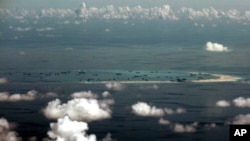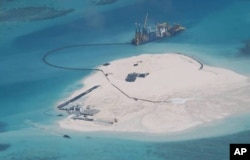A new large supply transport ship will help China get supplies to the islands it controls in the disputed South China Sea.
China is one of six governments with territorial claims to the 3.5 million-square-kilometer waterway. Since 2010, the others have expressed concern about Chinese efforts to build up islets, or small islands, for military purposes.
Brunei, Malaysia, Taiwan, Vietnam and the Philippines claim all or parts of the South China Sea. China claims about 90% of it.
The waterway is rich in natural resources.
Extra-large ship
The Sansha No. 2 transport ship can “cover the whole South China Sea,” reports China’s state-operated Xinhua News Agency. The ship passed tests in August. It has a displacement of over 8,000 metric tons and will help civilian and military work, Xinhua said.
The transport ship can go 6,000 kilometers without refueling and carry up to 400 people, the news agency noted. A ship that went into use 11 years ago could carry just 2,540 metric tons.
The Sansha No. 2 ship will help take equipment to the Paracel Islands – an area controlled by China, but also claimed by Vietnam. Some observers predict the ship may also take supplies to the more widely contested Spratly Islands.
Jay Batongbacal, a professor at the University of the Philippines, says China is showing other countries what it can do.
“They’re expanding their capabilities in all areas,” he said. “Deploying in the disputed areas is even more symbolic. It’s also more important for them, because they’re able to keep ahead” of the rest of the area.
This new large ship will probably take ammunition, food, fresh water and power equipment to the islets it now controls, said Andrew Yang of the Chinese Council of Advanced Policy Studies in Taiwan.
The newest ship will “increase logistics support” for Chinese troops based on the islets, Yang said. Logistics are what must be done to plan and organize a complex activity that involves many people. “They have troops and operations stationed there, so they certainly need some kind of more capable logistical support systems,” he said.
Spratly Island chain
The South China Sea stretches from Hong Kong south to the island of Borneo. The six governments with territorial claims prize it for fisheries, energy reserves and shipping lanes.
On three major islets in the Spratlys, China has built runways and buildings to hold military airplanes, notes the Center for Strategic & International Studies.
Other countries with South China Sea claims lack China’s military power or technology. The People’s Liberation Army, the world’s third largest, flew bomber airplanes to the Spratly Islands last year. China plans to deploy floating nuclear power stations to the sea in 2020, says the U.S. Department of Defense.
The transport ship marks the “latest technology” for China, Batongbacal said.
The builder of Sansha No. 2 and the one before it, Sansha No. 1, plans to work on a third transport ship “to provide better service to personnel stationed on islands,” Xinhua reported.
Taiwan sometimes sends a transport to the Spratly chain, Yang said. But he added that Taiwan has just one major island in that area.
Vietnam’s navy operates transport ships but uses smaller fishing boats for South China Sea transport jobs, notes Collin Koh of the Nanyang Technological University in Singapore. China could interfere with resupply operations handled by smaller vessels, he added.
The United States began increasing the number of ship passages through the sea in 2017 under President Donald Trump. The U.S. government does not claim the waterway but believes it should be open for international use.
I’m Anne Ball.
Ralph Jennings wrote this story for VOA. Anne Ball adapted his story, for Learning English. George Grow was the editor.
What do you think of this story? Write to us in the comments section below.
______________________________________________________________
Words in This Story
displacement – n. a technical word that means the amount of water that is moved by an object when it is placed in water
contest – v. to test or oppose in a competition
capability – n. the ability to do something
symbolic – adj. expressing or representing an idea or quality without using words
reserve – n. a supply of some material or product
lane – n. a passagway






